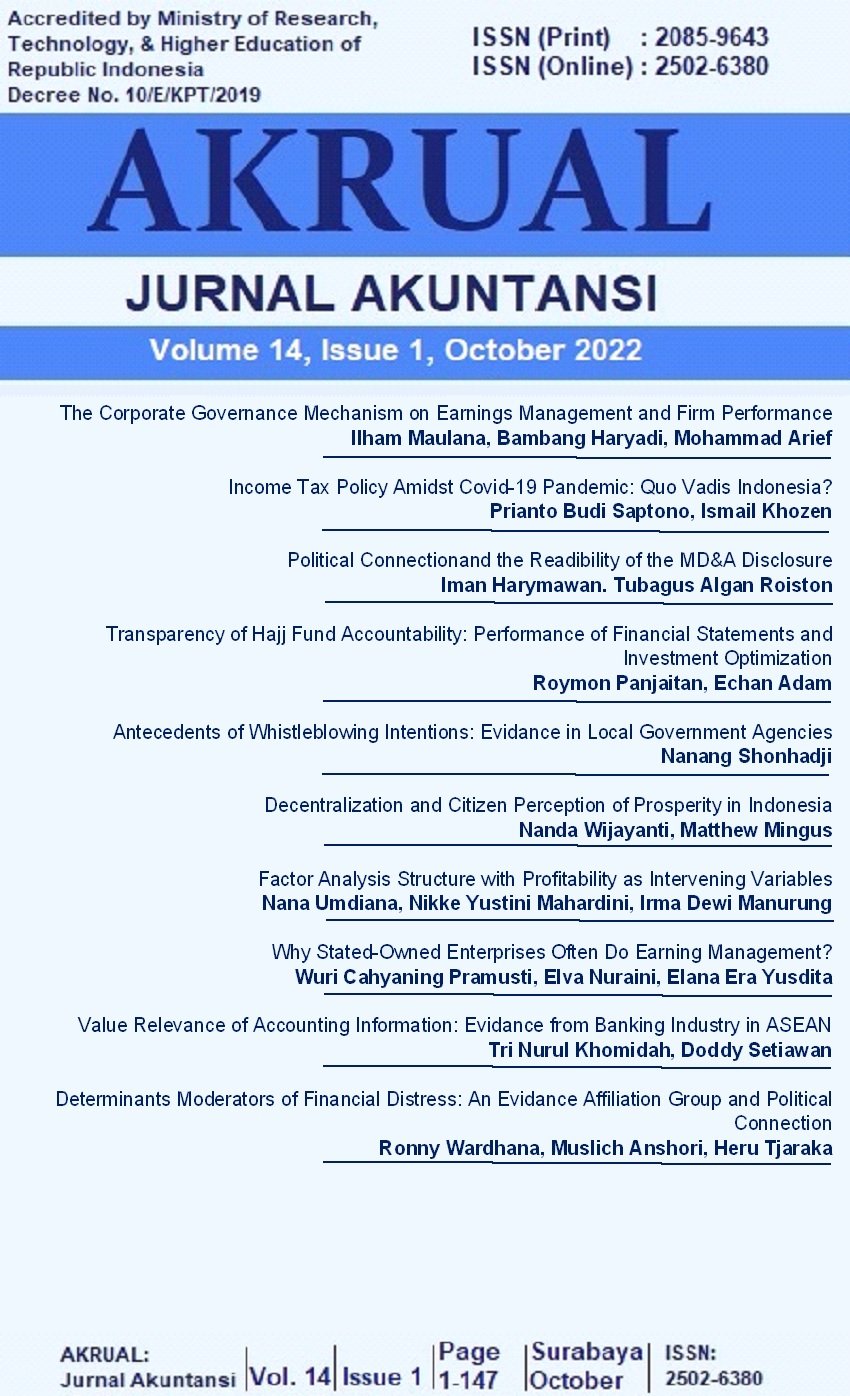Determinants Moderators of Financial Distress: An Evidence Affiliation Group and Political Connection
DOI:
https://doi.org/10.26740/jaj.v14n1.p132-147Keywords:
Capital Structure, Financial Distress, group affiliation, political connectionsAbstract
There is a theoretical gap in the research during the research period, so it is necessary to reconcile the findings, which is expected to be useful for all parties, academics, practitioners and related companies. The analysis used in this research is the Smart PLS tool. The population in this study are all manufacturing industrial companies listed on the Indonesia Stock Exchange for the 2017-2020 period. The sample of this study amounted to 144 companies. Tax aggressiveness shows results that do not affect the capital structure of manufacturing companies. Investment decisions affect the increase in capital structure in manufacturing companies. The capital structure shows a strong influence on financial distress in manufacturing companies. The results of the indirect effect test explain that tax aggressiveness has no significant effect on financial distress through capital structure. The results of the indirect effect test explain the substantial impact of investment decisions on financial distress through capital structure. The results of the moderating effect test show that the capital structure has no significant effect on financial distress with group affiliation moderation. The results of the moderating effect test explain the significant effect of capital structure on financial distress by moderating political connections.
References
Akmalia, A. (2020). Pengaruh Struktur Modal, Struktur Aset Dan Profitabilitas Terhadap Potensi Terjadinya Financial Distress Perusahaan (Studi Pada Perusahaan Manufaktur Sektor Aneka Industri yang Terdaftar di Bursa Efek Indonesia Periode 2014-2017).Business Management Analysis Journal (BMAJ), 3(1), 1-21
Chang, S. J. & Hong, J. (2000). Economic Performance of Group-Affiliated Companies in Korea: Intragroup Resource Sharing and Internal Business Transactions. The Academy of Management Journal 43 (3), 429-448.
Crocker, K. J., & Slemrod, J. (2005). Corporate Tax Evasion with Agency Costs. Journal of Public Economics, 89(9-10), 1593-1610. Doi: 10.1016/J.Jpubeco.2004.08.003.
Kenourgios, D., Savvakis, G.A., & Papageorgiou, T. (2019). The Capital Structure Dynamics of European Listed SMEs. Journal of Small Business & Entrepreneurship, 26(2), 2595-2611. Doi: 10.1080/08276331.2019.1603946
Damayanti & Prastiwi. (2017). Peran OECD dalam Meminimalisasi Upaya Tax Agresiveness pada Perusahaan Multinationality. Jurnal Akuntansi Multiparadigma, 8(1), 79-89. Http://Dx.Doi.Org/10.18202/Jamal.2017.04.704
Faccio, M. (2006). Politically Connected Firms. Journal American Economic Assosiation, 96(1), 369-386. DOI: 10.1257/000282806776157704
Amanda, F. N. & Muslih, M. (2020). The Effect of Operating Cash Flow, Independent Commissioners, Capital Structures on Financial Distress (Study of Food and Beverage Sub Sector Manufacturing Companies Listed on The Indonesia Stock Exchange Period of 2015-2018). E-Proceeding of Management, 7(2)
Ikpesu, F. & Eboiyehi, O. C. (2018). Capital Structure and Corporate Financial Distress of Manufacturing Firms in Nigeria. Journal of Accounting and Taxation 10(7), 78-84. DOI: 10.5897/Jat2018.0309
Jalan, A., Kale, J. R., & Meneghetti, C. (2016). Debt, Bankruptcy Risk, and Corporate Tax Aggressiveness. Working Paper.
Levy, P.S. & Lemeshow, S. (1997). Sampling of Populations: Methods and Applications, 3 Rd Ed. New York: Wiley-Interscience.
Locorotondo, R., Dewaelheyns, N., & Van Hulle, C. 2014. Cash Holdings and Business Group Membership. Journal of Business Research, 67(3), 316- 323. https://doi.org/10.1016/j.jbusres.2013.01.019
Nurhasanah, S., & Sumardi, R.(2018). Pengaruh Financial Leverage, Struktur Modal dan Total Aset Growth Financial Distress pada Perusahaan Subsektor Pulp dan Kertas yang Terdaftar di Bursa Efek Indonesia. Jurnal Ilmu Manajemen, 2, 26-42.
Pandey, I. M. (2009). Essentials of Financial Management (1st Edition). New Delhi: Vikas Publishing House Ltd.
Permata, S., Nugroho, R., & Muamarah, H.S., (2021). Pengaruh Financial Distress, Manajemen Laba, dan Kecakapan Manajemen terhadap Agresivitas Pajak. Jurnal Info Artha, 5(2), 93-107.
Pratheepan, T., & Banda, Y. K. W. (2016). The Determinants of Capital Structure: Evidence From Selected Listed Companies in Sri Lanka. International Journal Of Economics And Finance, 8(2), 94-106. https://dx.doi.org/10.2139/ssrn.2725792
Pratiwi, N. P. D., Mahaputra, I. N. K. A., & Sudiartana, I. M. (2020). Pengaruh Financial Distress, Leverage dan Sales Growth Terhadap Tax Avoidance pada Perusahaan Manufaktur yang Terdaftar di BEI Tahun 2016. Kumpulan Hasil Riset Mahasiswa Akuntansi (Kharisma), 2(1), 202-211.
Ahmadi, R. & Kordloei, K. (2018). The Effect of Financial Distress on The Investment Behaviour of Companies Listed on Tehran Stock Exchange. Advances In Mathematical Finance & Applications, 3(4), 17-28. https://doi.org/10.22034/amfa.2019.565459.1108
Sadjiarto, A., Florencia, & Nevanda, O. (2019). Effects of Political Connections and Corporate Governance on Tax Aggressiveness in Indonesian Service and Banking Sectors. Journal of Economics and Business, 2(1), 190-204. DOI: 10.31014/aior.1992.02.01.79
Sutomo S, Wahyudi, S., Irene, Pangestuti, I.R.D., & Muharam, H. (2020). The Determinants of Capital Structure in Coal Mining Industry on The Indonesia Stock Exchange. Investment Management and Financial Innovations, 17(1), 165-174. DOI:10.21511/Imfi.17(1).2020.15
Wulandari, L. (2018). Pengaruh Political Connection pada Dewan Komisaris dan Dewan Direksi Terhadap Kinerja Perusahaan Sektor Pertambangan yang Terdaftar di Bursa Efek Indonesia (BEI) Periode Tahun 2010-2014. Calyptra: Jurnal Ilmiah Mahasiswa Universitas Surabaya,7(1), 1196-1226
Zhang, H. (2012). How Does State Ownership Affect Tax Avoidance? Evidence From China. Working Paper. School Of Accountancy, Singapore Management University.
Downloads
Published
How to Cite
Issue
Section
License
Copyright (c) 2022 Rony Wardhana, Muslich Anshori, Heru Tjaraka

This work is licensed under a Creative Commons Attribution-NonCommercial 4.0 International License.
 Abstract views: 1038
,
Abstract views: 1038
, PDF Downloads: 868
PDF Downloads: 868


















